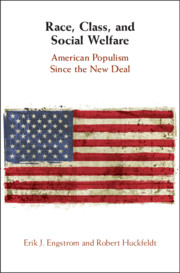Book contents
- Race, Class, and Social Welfare
- Race, Class, and Social Welfare
- Copyright page
- Dedication
- Contents
- Figures
- Tables
- Preface and Acknowledgments
- 1 American Politics and Social Welfare
- 2 Politics at the Intersection of Race, Class, and Oligarchy
- 3 Civil Rights, Social Welfare, and Populism
- 4 Civil Rights and Populism
- 5 Race, Class, and the End of the New Deal in the US Senate
- 6 Transforming the Twentieth-Century House
- 7 Race, Class, and a Transformed Political Economy
- 8 Dueling Populists and the Political Ecology of 2016
- 9 Conclusion: The Dangers of Upside-Down Populism
- Bibliography
- Index
2 - Politics at the Intersection of Race, Class, and Oligarchy
Published online by Cambridge University Press: 07 July 2020
- Race, Class, and Social Welfare
- Race, Class, and Social Welfare
- Copyright page
- Dedication
- Contents
- Figures
- Tables
- Preface and Acknowledgments
- 1 American Politics and Social Welfare
- 2 Politics at the Intersection of Race, Class, and Oligarchy
- 3 Civil Rights, Social Welfare, and Populism
- 4 Civil Rights and Populism
- 5 Race, Class, and the End of the New Deal in the US Senate
- 6 Transforming the Twentieth-Century House
- 7 Race, Class, and a Transformed Political Economy
- 8 Dueling Populists and the Political Ecology of 2016
- 9 Conclusion: The Dangers of Upside-Down Populism
- Bibliography
- Index
Summary
The events leading to the adoption of key civil rights and voting rights legislation in the 1950s, 1960s, and 1970s came at a critical moment in American political history – a moment that preserved the legitimacy of the American political system. Absent those events, denials of citizenship rights based on race and ethnicity would have been sustained in large parts of the country, the “Second Revolution” in American politics (McPherson 1992) would have been aborted, and the United States would have ceased to qualify as a democracy. The efforts and sacrifices made at Antietam in 1862, Gettysburg in 1863, Ford’s Theater in 1865, Little Rock in 1957, Birmingham in 1963, Selma in 1965, and at other countless places and times would have been wasted. Moreover, the transforming potential of the due process, equal protection, and citizenship guarantees of the Thirteenth, Fourteenth, and Fifteenth Amendments would have gone unrealized.
- Type
- Chapter
- Information
- Race, Class, and Social WelfareAmerican Populism Since the New Deal, pp. 16 - 30Publisher: Cambridge University PressPrint publication year: 2020



